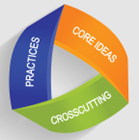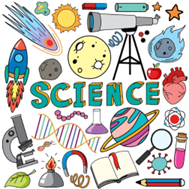Joseph N. Amaral, M.Ed., M.A. – Science Teacher

Phone: (401) 462-7390
Email: joseph.amaral@dcyf.ri.gov
Teacher Certification: Physics, General Science, and Mathematics
The Science program at the Rhode Island Training School will help students grow by learning fundamental natural principles and how it applies to the world. Science learning will be propelled by using the Next Generation Science Standards (NGSS) throughout all courses.
Mission: Inspire students to identify and solve real-world problems by using observation skills and data.
Vision: Our vision is to inspire students, ignite interest, and improve science competency with the goal of making students critical thinkers in everyday life.

Crosscutting Concepts help students explore connections across the four domains of science, including Physical Science, Life Science, Earth and Space Science, and Engineering Design. When these concepts, such as “cause and effect”, are made explicit for students, they can help students develop a coherent and scientifically based view of the world around them. All science courses have similar theories and patterns that are universal. Students will examine matter, biology, environmental and physics to explain natural phenomena. This curriculum is taught in a multidisciplinary approach, or at times in a discipline specific content, to build basic understanding.

Science and Engineering Practices describe what scientists do to investigate the natural world and what engineers do to design and build systems. The practices better explain and extend what is meant by “inquiry” in science and the range of cognitive, social, and physical practices that it requires. Students engage in practices to build, deepen, and apply their knowledge of core ideas and crosscutting concepts. We are excited to partner with Mystic Aquarium to help our students explore environmental research with research proven learning “kits.” Students will also have access to view and explore scientific theories through online programs such as NOVA, Scientific Scholastic, BBC World of Science, and the National Science Foundation. Students are given opportunities to examine concepts through a “hands-on” approach as well as through current literature.

Disciplinary Core Ideas (DCIs) are the key ideas in science that have broad importance within or across multiple science or engineering disciplines. These core ideas build on each other as students’ progress through grade levels and are grouped into the following four domains: Physical Science, Life Science, Earth and Space Science, and Engineering. Students have access to content knowledge that is primary to reaching high levels of critical thinking. Scientific vocabulary and comprehension activities are emphasized in the classroom so that students can use scientific language to communicate observations and theories.
Quarterly Portfolios are designed to showcase students understanding and knowledge of key scientific concepts. The following rubric is used to measure their performance:
| Criteria |
4 - Exemplary |
3 - Proficient |
2 - Developing |
1 - Beginning |
| Communication: Communicates science knowledge and applications through writing, speech, and visual displays | Identification and descriptions of science terms, facts, concepts, and principles are complete and correct. | Identification and descriptions of science terms, facts, concepts, and principles are mostly complete and correct | Identification and descriptions of science terms, facts, concepts, and principles are somewhat complete and correct | Identification and descriptions of health terms, facts, concepts, and principles; basic body parts are minimally complete and correct |
| Application: Applies science knowledge, skills, and methods to manipulate, analyze, synthesize, create and evaluate | Application of science knowledge, skills, and methods to manipulate, analyze, synthesize, create and evaluate are complete, appropriate and accurate. | Application of science knowledge, skills, and methods to manipulate, analyze, synthesize, create and evaluate are mostly complete, appropriate and accurate. | Application of science knowledge, skills, and methods to manipulate, analyze, synthesize, create and evaluate are somewhat complete, appropriate and accurate. | Application of health knowledge, skills, and methods to manipulate, analyze, synthesize, create and evaluate are minimally complete, appropriate and accurate. |
| Knowledge: Knows and understands science terms, facts, concepts and principles. | Written, oral and/or visual communication of science knowledge and applications are well organized and effective. | Most of the written, oral, and/or visual communication of science knowledge and applications are well organized and effective. | Some of the written, oral and/or visual communication of science knowledge and applications are well organized and effective | Little of the written, oral and/or visual communication of health knowledge and applications are well organized and effective. |